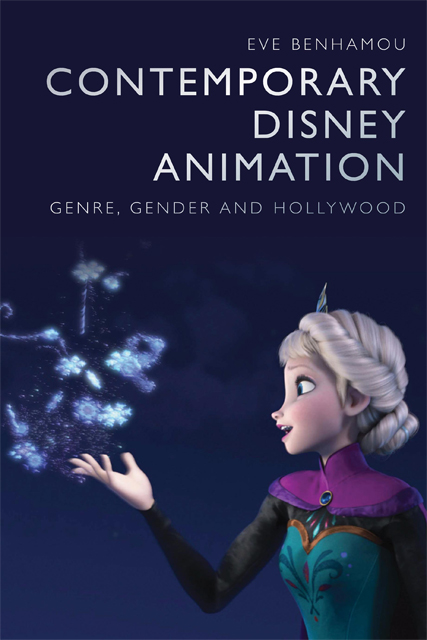4 - Brave New Tale? Reframing Love and Romance in Frozen
Published online by Cambridge University Press: 14 July 2023
Summary
Who will save the day? The ice guy? The nice man? The snowman? Or no man? (Disney’s Frozen, Chris Buck and Jennifer Lee, 2013, Official Trailer)
Building on the successful marketing strategy for Tangled (Nathan Greno and Byron Howard, 2010), Disney’s initial trailers and posters for the studio’s third contemporary animated fairy tale showcased a thrilling action-adventure comedy seemingly far from Disney’s sentimental formula. Nevertheless, like its two fairy-tale predecessors, Frozen’s film text actually draws on familiar fairytale and musical tropes, while interacting with several strands of the romantic mode, to revisit and renew the studio’s iconic formula. The official trailer hinted at two aspects revealing to be pivotal in such a renewal: the central role of female characters and sisterhood (‘Who will save the day? … no man?’), and the presence of an alternative to the conventional Disney male lead (‘The ice guy? The nice man?’). These two aspects form the basis for Frozen’s generic revision. Focusing on the original 2013 film, this chapter explores how Frozen questions the primacy and plausibility of fairy-tale romance as displayed throughout Disney’s canon; how it challenges and reframes its foundation, namely the concept of ‘true love’, and, to some extent, its associated heteronormative trajectory.
The film focuses on two orphaned princesses, naive but resourceful Anna (Kristen Bell) and more distant Elsa (Idina Menzel), who was born with extraordinary ice powers. On the latter’s coronation day, Elsa and Anna have an argument following Anna’s hasty engagement to chivalric Prince Hans (Santino Fontana). Upset, Elsa unwittingly traps Arendelle in an eternal winter and flees her kingdom, which drives Anna to set off on a perilous journey to the North Mountain to bring her sister back. She is reluctantly helped by ice harvester Kristoff (Jonathan Groff), whose personality and conception of romance initially clash with hers, and an endearing snowman named Olaf (Josh Gad).
Foregrounding two heroines and two heroes, Frozen develops the approach initiated in neo-traditional and nostalgic The Princess and the Frog (Ron Clements and John Musker, 2009) and DreamWorks-inspired Tangled. The contrasting portrayals of Tiana and Charlotte in the former, and Flynn/Eugene in the latter, allow a degree of subversion, parody and self-awareness, which Frozen takes strikingly further.
- Type
- Chapter
- Information
- Contemporary Disney AnimationGenre, Gender and Hollywood, pp. 100 - 122Publisher: Edinburgh University PressPrint publication year: 2022



